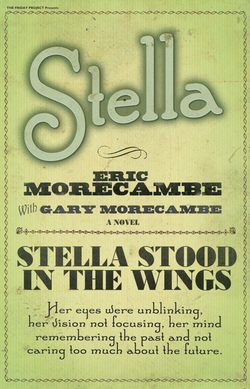Читать книгу Stella - Gary Morecambe, Eric Morecambe - Страница 5
ОглавлениеIntroduction
It must have been about two days after my father’s untimely death that I ventured into his upstairs office.
It had taken some courage to do this, because this book-laden room was his shrine, and almost every previous time that I had entered it I had discovered his hunched figure poised over his portable typewriter, the whole room engulfed with smoke from his meerschaum pipe.
The acrid smell of stale tobacco still lingered, and would continue to for weeks to come. The silent typewriter was still sitting in the position it had been when my father had last sat in front of it. I would have paid no more attention, had it not been for the sheet of paper that caught my eye.
Headed STELLA, P. 61, there were only about eight typed lines on the sheet. I cannot wholly recall what they said, but it was enough to remind me that my father had been deeply involved in what would have been his second novel.
Intrigued, I began a search for notes, pages, anything that had been destined for the novel. It was remarkable just how much turned up considering that he had never before kept many notes. But then, as we discovered shortly after his death, it was as though he knew that something was going to happen to him, because he had tidied up most aspects of his life from taxation to photo albums.
Anyway, by the end of that day spent searching, I had gathered nearly two thirds of the manuscript – some completed, some merely in note form.
I asked my mother how she would feel about me taking on the project of finishing the novel. ‘It’s a good idea,’ she said. ‘He had spent much of his time on it. It would be nice to see it finished.’ And so my first draft of STELLA went into production.
He had often talked to me about STELLA, quoting lines from it, showing me the latest passage he was working on, and explaining that the background would be very similar to his own. I would smile and listen attentively, glad to see the pleasure it was giving him, but totally unaware that day I would desperately be racking my brain for those little snippets of information he had casually given to me.
Stella’s background is very similar to his own. She even plays in the streets he played in when he was a boy. In fact, the pattern of Stella’s career is not so different from his own, though I’m sure he won far more talent competitions than poor Stella is allowed to win in this story.
While the characters are not based on particular individuals, there is a sense of recognition about them. They suit the story so well, one can’t help but assume that they closely resemble many of the people my father had to contend with on his way to the top.
Perhaps it was because most of the work I did on this book was carried out at the same desk in the same favourite office of my father’s that I felt he was ever-present, and always there to give me a guiding hand. And during the more hilarious pieces I worked on I am convinced I could hear him chuckling over my shoulder at his own lines. So, in a strange way, I feel we worked at the book together and not independently.
The office has altered very little during the last two years and I still often use it, convinced it is a source of great inspiration to me.
My father’s notes on STELLA are now blended with mine in brown and blue cardboard folders that line a shelf of the study. They represent the months of pleasure I derived from putting the novel together. I hope you derive as much pleasure from reading it.
Gary Morecambe
1968
